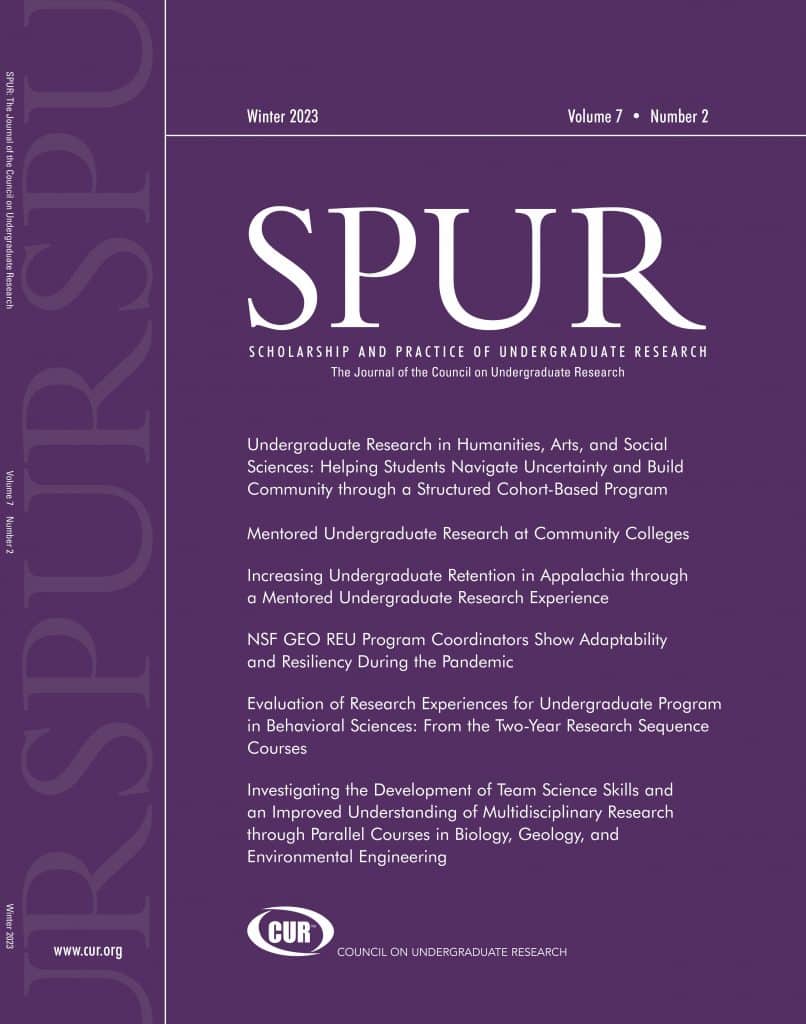SPUR (2024) 7 (2): https://doi.org/10.18833/spur/7/2/2
The benefits of undergraduate research experiences are well documented, yet few studies focus on programs designed to support students conducting research in the fields of humanities, arts, and social sciences. In this study, the authors examine learning experiences of students participating in the undergraduate research programs (URP) at UCLA, which support students conducting multiterm research or creative projects with faculty mentors. Drawing on data from students who participated in URP from 2015 to 2022 (N = 431), findings indicated that URP offered students structure, resources, mentorship, and peer networks to help them succeed. Further, students made significant gains in feeling connected to the research community and reported that undergraduate research was an important component of their academic career.
Recommended Citation: Toven-Lindsey, Brit, Erin M. Sparck, Kelly Kistner, Jacquelyn Ardam, Whitney Arnold. 2023. Undergraduate Research in Humanities, Arts, and Social Sciences: Helping Students Navigate Uncertainty and Build Community through a Structured Cohort-Based Program. Scholarship and Practice of Undergraduate Research 7 (2): 15-24. https://doi.org/10.18833/spur/7/2/2
Undergraduate research experiences are an important component of an undergraduate education for many students and can have wide-ranging benefits, including gaining new knowledge about the scientific method and research procedures (Craney et al. 2011; Kistner et al. 2021); critical thinking skills (Brownell et al. 2015); persistence in their undergraduate major (Craney et al. 2011); and entry into graduate school (Wilson et al. 2018). These benefits are particularly important for students from minority groups who have often been excluded from these high-impact and immersive learning opportunities (Estrada, Hernandez, and Schultz 2018; Hernandez et al. 2018). Additionally, undergraduate research participation has been shown to support students’ identity development (Palmer et al. 2015; Robnett, Chemers, and Zurbriggen 2015) and sense of belonging on campus (Miller, Williams, and Silberstein 2019).
Yet the literature on benefits of undergraduate research has been primarily focused on students in science, technology, engineering, and math (STEM) fields, leaving a gap in knowledge about research programs focused specifically on the needs of students in humanities, arts, and social sciences (HASS; Craney et al. 2011; Haeger et al. 2020). Whereas undergraduate research in STEM fields is often highly structured and guided by faculty and graduate mentors, students’ independent research experiences in HASS fields can be more variable, with differing amounts of oversight, structure, and training (Craney et al. 2011). Further, there may be limited incentives for faculty across disciplines to dedicate time and energy to mentoring undergraduate researchers (Becker 2020; Webber, Nelson Laird, and BrckaLorenz 2013), indicating a need for institutional resources and support.
In this study the authors examine student learning experiences in the Undergraduate Research Fellows and Scholars Programs (URFP and URSP, hereafter referred to as URP) at the University of California Los Angeles (UCLA), which supports students performing a multiquarter research or creative project each year under the mentorship of a faculty member on campus. Previous research on URP highlights numerous learning and career outcomes. Students report that these programs advance their critical thinking and problem-solving skills, professionalism, and written and oral communication skills (Kistner et al. 2021), and that they help students develop faculty mentorship and peer networks (Arnold et al. forthcoming).
Structured programs like URP create more standardized pathways to research and in turn increase access to research opportunities for diverse groups of students, but further study is needed to examine how students conceptualize their learning and advancement as researchers during their undergraduate years. To build upon previous findings and contribute to the literature on programs for students conducting research in HASS fields, this study aimed to better understand student experiences in URP and how structured research programs help students build confidence in their research skills and connections to the community of scholars in their field.
Literature
Participation in undergraduate research provides students with opportunities to learn about the disciplinary norms and the ways of thinking and practices in a particular field (Barker 2009; Hall et al. 2021; Hunter, Laursen, and Seymour 2007). Students participating in guided research gain confidence, critical thinking and technical skills, and clarification of their future career aspirations (Hunter et al. 2007; Thiry, Laursen, and Hunter 2011); have the chance to see faculty model a particular version of learning and inquiry (Palmer et al. 2015; Palmer et al. 2018); and gain methodological and technical proficiency in their field (Feldman, Divoll, and Rogan-Klyve 2013). Yet, although many outcomes of undergraduate research benefit students across disciplines, there are differences in student goals and needs.
In their study of cross-disciplinary perspectives of undergraduate research, Craney and colleagues (2011) found that students in social sciences and humanities highly valued producing papers and publications as a primary outcome of their research experience, whereas students in STEM fields were more likely to value gains in specific technical skills. Further, students in HASS fields were more likely to pursue a research project that interested them than STEM students, and they also were more likely to be conducting research on their own and not together with their peers (Craney et al., 2011).
These findings point to the unique needs and interests of students conducting research in HASS fields, and the importance of considering the role of academic discipline in designing undergraduate research programs. Further, students can often feel disconnected from the research activities of their university (Palmer et al. 2015) and face barriers to accessing hands-on learning experiences. As a large, public research-intensive institution with a diverse student population, UCLA provides opportunities for many students to engage in cutting-edge research. Yet, accessing undergraduate research experiences can be challenging when one considers the wide range of academic programs and complex network of research activities. Students may lack the research capital (defined as “the economic, social, and cultural capital that influence students’ paths to engaging in undergraduate research”; Cooper, Cala, and Brownell 2021, 4) to navigate these unfamiliar pathways at undergraduate institutions (Ovink and Veazey 2011).
To broaden access and help students navigate the research process, many campuses have developed undergraduate research centers and programs, with the majority focused primarily on (and established to support) STEM students. Well-structured research programs have been shown to support retention of minority students in STEM, in particular, and to help increase a sense of belonging through components such as faculty mentoring and early exposure to research (Carter, Mandell, and Maton 2009; Chang et al. 2014; Sellami et al. 2021). In a study of the McNair Scholars Program focused on the experiences of 13 Black students, Clayton, Breeden, and Davis (2023) found that participation in undergraduate research helped students, most of whom were in HASS majors, build confidence capital through hands-on research and exploring graduate school opportunities, sharing their research at conferences and meetings, and building a network of mentors and peers. Further, faculty mentorship was an important component of students’ growth as scholars and of building confidence to navigate academic spaces and graduate school applications (Clayton et al. 2023). Many of these programs are highly structured and guide small cohorts of students through the process of accessing and participating in undergraduate research. Undergraduate research centers and programs like URP can help broaden participation and combat perceptions about the exclusivity of research by offering more direct and accessible pathways into a wider range of undergraduate research experiences (Haeger et al. 2021).
Methods
Research Setting
UCLA is a highly selective research-intensive university in southern California that enrolls more than 6,000 first-year students and 3,500 transfer students each year. Approximately 30 percent of incoming first-year students and 34 percent of incoming transfer students in fall 2022 were students from minority racial and ethnic groups, and 27 percent and 43 percent of these groups, respectively, were first-generation undergraduate students. UCLA is a research-intensive institution, and many undergraduates participate in guided research experiences. According to data from the UCLA College Senior Survey (UCLA 2023) collected from 2014 to 2022 (N = 50,829), around 30 percent of respondents, regardless of major, assisted faculty with research on a voluntary basis (these experiences may offer students course credit), and 47 percent collaborated with peers on a course-based research project. Although these numbers do not capture the full range of research engagement, it does indicate that research is an important component of UCLA students’ undergraduate experience.
Undergraduate Research Fellows and Scholars Program
The UCLA Undergraduate Research Center for Humanities, Arts, and Social Sciences (URC-HASS) was established in 1998 with a primary mission of promoting, developing, and celebrating undergraduate student research and creative inquiry, while also enhancing undergraduate education and preparing students for careers in all areas. URC-HASS supports students with a wide range of programs and services, including research courses and resources, campus-wide events and programming, and scholarships. One set of programs, the Undergraduate Research Fellows and Scholars Programs, provides financial support for students to do multiquarter research or creative projects under the mentorship of a UCLA faculty member.
Students in both programs enroll in a research contract course for credit with their faculty mentor, receive a scholarship, and present their work during the annual Undergraduate Research Week. Students in the Undergraduate Research Fellows Program additionally participate in a research and professional development course taught by faculty in URC-HASS. Through these and other activities, students receive guidance from URC-HASS graduate research mentors and build community with their peers. The Undergraduate Research Scholars program is reserved for more advanced students (third- and fourth-year students) who are completing a comprehensive independent research project, honors thesis, or capstone. Although these students do not enroll in the research and professional development course, they can still meet with graduate mentors, participate in workshops, and present during the campus research week. Hereafter, data from these programs will be combined, and they will be referred to as the Undergraduate Research Programs (URP).
Data Collection and Analysis
This study draws on data from numerous sources to better understand the experiences of students who participated in URP from 2015 to 2022 (N = 483). To better understand the landscape of undergraduate experiences at UCLA, this study includes participating students’ responses to the Senior Survey (N = 208). Specifically, coded data from open-ended responses to the question: “What was your most meaningful learning experience at UCLA?” were analyzed. Additionally, all students participating in URP were invited to complete a survey at the beginning and end of the program (N = 431 matched responses). Table 1 provides an overview of select student background characteristics for all URP students and those who completed the pre- and post-surveys, including gender, transfer student status, and identification as a member of a minority racial/ethnic group.
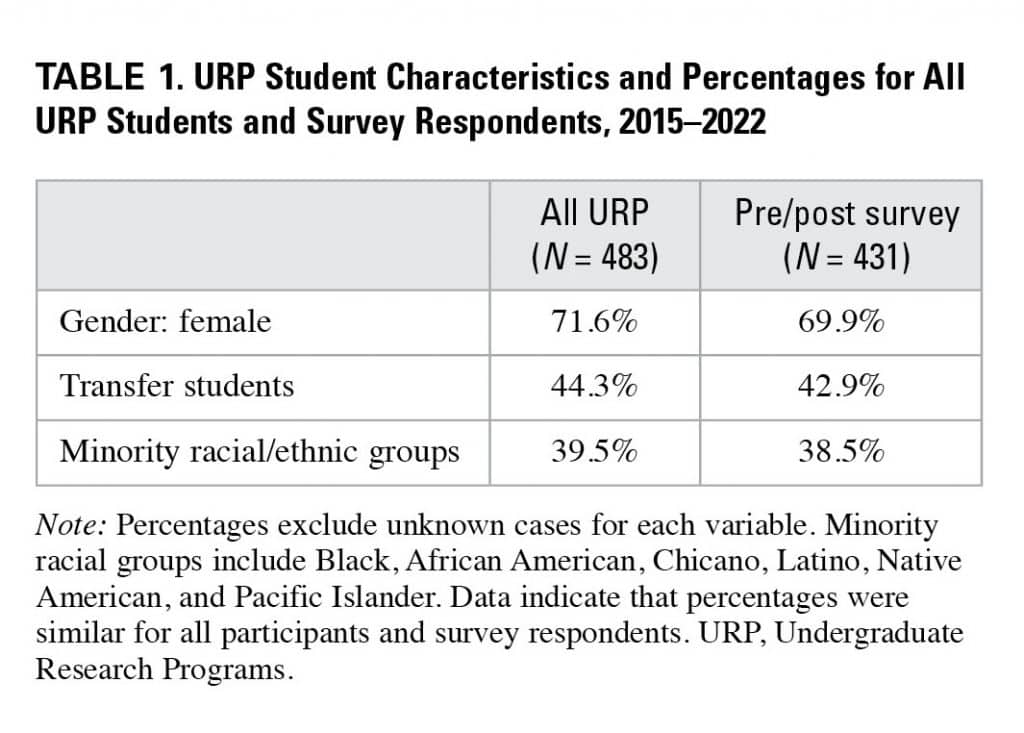
All students participating in URP are invited to complete a survey about their experiences at the beginning and end of the program. Although the survey is designed to capture shifts in student perceptions and attitudes about research during the program, students do enter these programs with varying levels of experience with conducting research. Select survey questions were included for analysis, including those focused on students’ individual research projects, the research community at UCLA, and specific components of URP, as well as open-ended responses to the question: “What has been most helpful about [URP]?” (N = 403; see Table 2). Finally, students in the 2021–2022 cohorts of URP submitted reflection memos (N = 54) focused on their experiences in the program and conducting their research projects.
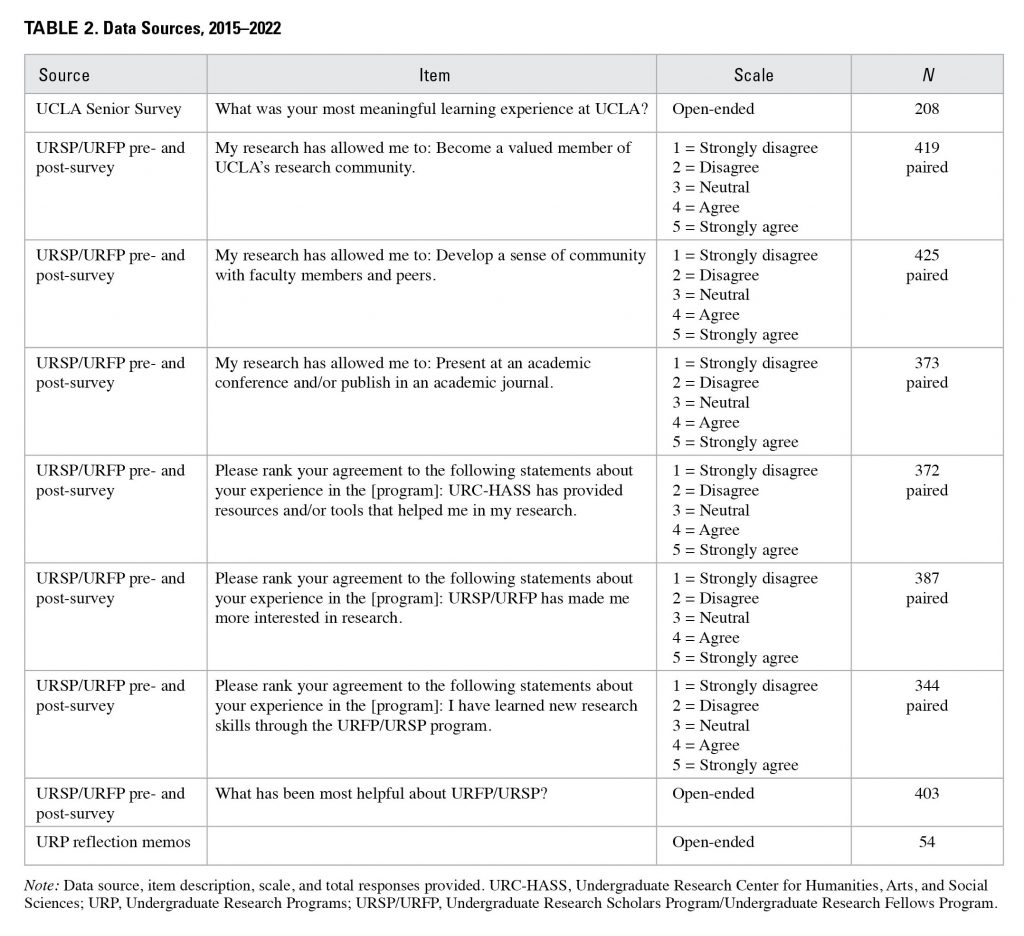
Program surveys were analyzed using descriptive statistics and paired samples t tests of significance in SPSS. Students’ open-ended responses and reflection memos were analyzed using Dedoose qualitative coding software. Thematic analysis of reflection memos and open-ended questions was guided by existing literature on outcomes of undergraduate research, including skill development, faculty mentorship, barriers to engagement, and identity development (e.g., Craney et al. 2011; Kistner et al. 2021; Palmer et al. 2015). Researchers began coding with these a priori themes, and student comments also produced emergent themes, such as a sense of ownership and agency related to their research projects (Maxwell 2013; Saldaña 2013). Codes were developed and tested by multiple researchers in an iterative process across multiple terms for open-ended responses to establish a final codebook.
Findings
Structure, Peer Networks, and Support for Research
Paired samples t tests for pre- and post-survey responses indicated that students received needed support and resources in URP to successfully conduct their research projects (see Table 3). Specifically, the majority of students reported that the resources and tools provided by URP helped them with their research project (mean = 4.28, SD = 0.78 at post; p < .001) and that they learned new research skills as part of the program (mean = 4.34, SD = 0.81 at post; p < .001). Students also reported that participating in URP contributed to their interest in research (mean = 4.25, SD = 0.92 at post; p < .001). Additional mean score comparisons by gender, race/ethnicity, and transfer status did not result in significant differences between groups.
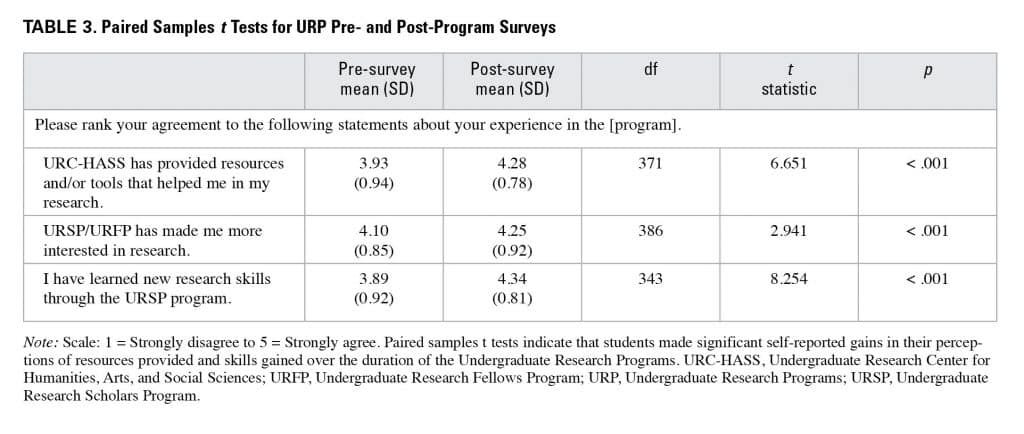
Students’ open-ended responses about those features of URP that were most helpful further illuminated these findings (N = 403; see Table 4). The most prominent themes about helpful aspects of the program included: (1) the structure, guidance, and accountability of URP (173 coded excerpts); (2) program funding and course credit give students the flexibility to focus on their research project (109 coded excerpts); (3) support and community from peers (93 coded excerpts); (4) mentorship and guidance from graduate mentors and program staff (75 coded excerpts); and (5) the positive environment and supportive culture of the program in general (69 coded excerpts).
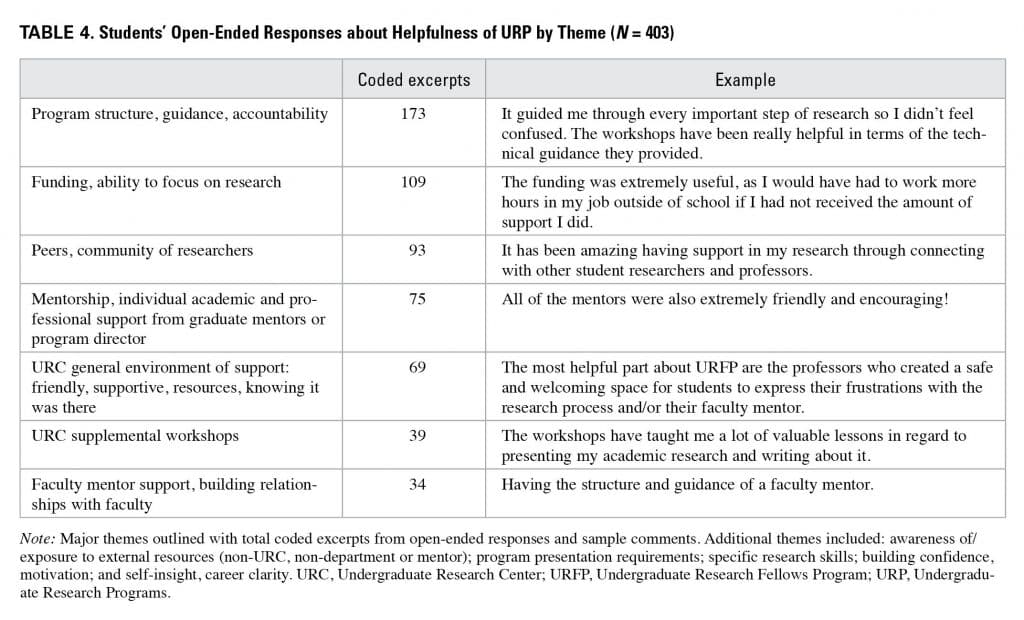
Regarding the overall structure and accountability that the program offered, one student commented, “[URP] has given me a clear direction as to how I can initiate and execute a research project.” Another said, “The most helpful aspect has been the structure and encouragement—I don’t think I would have initiated this student project without the program’s existence.” URP offered students different options for formal programming and structure to meet their needs, from weekly class meetings that introduced students to best practices and campus resources for research to drop-in workshops and mentor check-ins for more advanced students, and these findings indicated that all students benefited from the ongoing support and accountability built into these programs.
Program funding was also crucial for many students. As one student put it, “As a first-generation low-income student I have always had to work … [URP] gave me the opportunity to focus on research and decrease[d] financial stressors.” The structure and stipend of URP helped students gain new skills, stay on track, and focus their energy in ways that pushed their research projects forward.
Scholarly Community
Building connections and a sense of belonging in the research community is an important outcome of undergraduate research experiences (e.g., Museus, Yi, and Saelua 2017; Palmer et al. 2015). Analysis of responses to program surveys at the beginning and end of URP indicated that students made significant gains in their identity as members of the research community at UCLA during the program. As Table 5 indicates, students reported significant gains in (1) their feelings about being a valued member of the UCLA research community; (2) developing a sense of community with faculty and peers; and (3) presenting at academic conferences and/or publishing in an academic journal, all as a result of their participation in URC. Additionally, students indicated that one of the reasons they chose to conduct research in URP was because they saw their peers engaged in research (pre-survey mean = 2.994, post-survey mean = 3.186; p < .001).
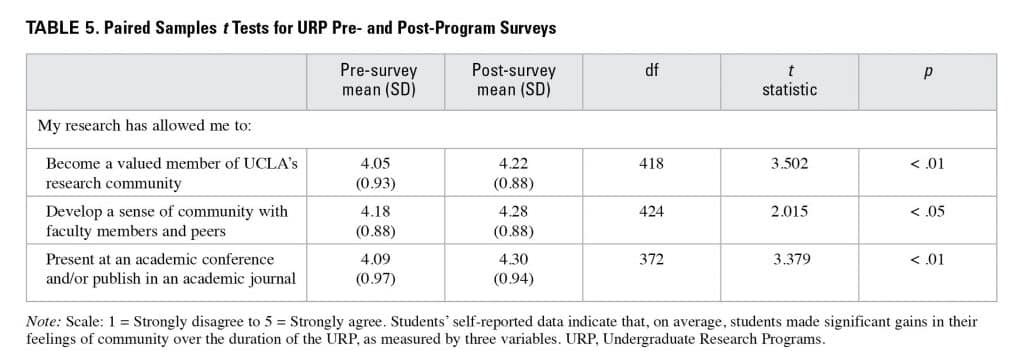
Two of the major themes that emerged from the analysis of reflection memos (N = 54) were students’ (1) sense of agency and ownership of their research projects (N = 33 participants); and (2) sense of belonging in the community of scholars at UCLA (N = 29 participants; see Table 6). More than 20 percent of students (N = 12) addressed both of these themes in their reflections, indicating that a strong sense of ownership of their research project also may have contributed to their sense of belonging in the research community. As one transfer student majoring in art said, “What feels most rewarding is having the support and encouragement to ask questions that deeply matter to me . . . the kind of total autonomy to choose a topic and my level of personal investment is creating a different kind of experience.” Another student majoring in psychology stated, “[URP] has also allowed me to gain a better understanding of my place at UCLA as a researcher … Being a transfer student, I started to have imposter syndrome and was worried about how I would fit in at UCLA … Being a part of [URP] showed me that I belong here and faculty members see my worth.” As these comments illustrate, having the opportunity to design and conduct their own projects helped students not only develop technical skills, but also confidence in their abilities and identity as a researcher.
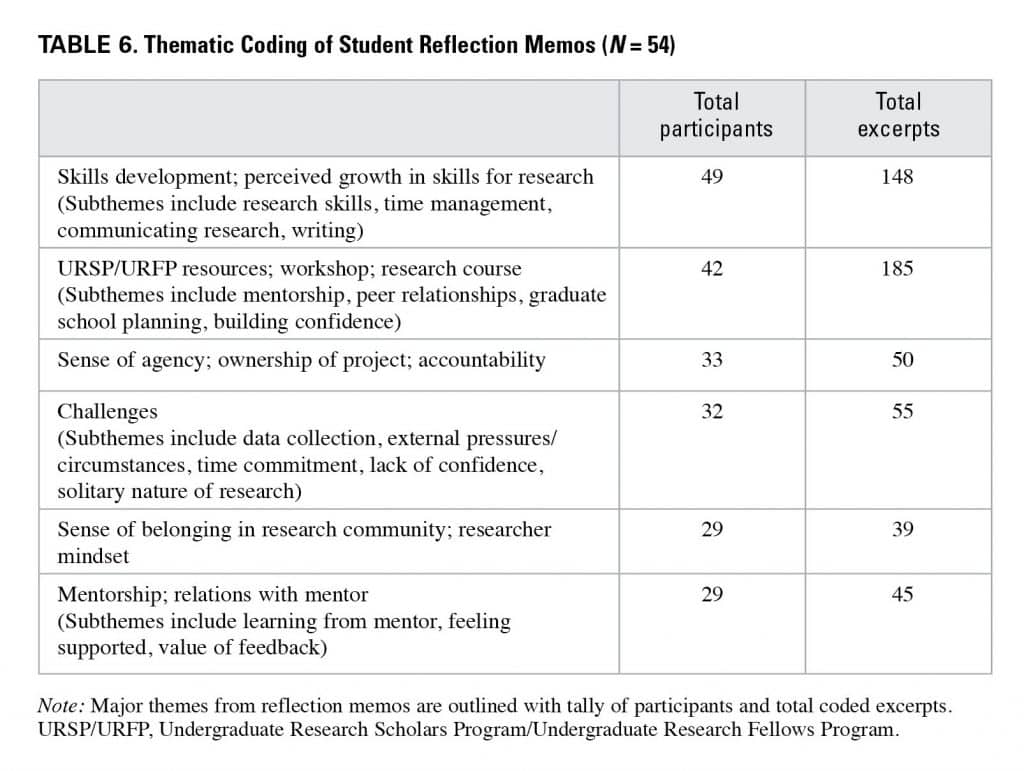
Academic Journey
Nearly all students who participated in URP completed the UCLA College Senior Survey, and 208 commented on their most meaningful learning experiences. Nearly 40 percent of students talked about undergraduate research as one of these important learning experiences (N = 81). About their experience in URP, one student commented, “I am able to learn research skills and gain opportunities to get in touch with the research community, which motivates me to continue doing research in the future and to pursue a higher degree in psychology.” Another said, “My most meaningful experience was meeting my current graduate mentor and having the opportunity to participate in research programs to present my research at various conferences. It was something I never imagined I would do.” As these students indicated, being involved in research as an undergraduate offered students a chance to gain new skills and knowledge, and to build confidence in their abilities.
Responses to the URP program survey indicated that students felt a sense of ownership and connection to their research projects. In the post-survey, 95.6 percent of students agreed or strongly agreed that their research project built on their academic interests (N = 424); 91.2 percent indicated that they had initiated and designed their project (N = 416); and 93.7 percent said that their project exposed them to new areas of intellectual curiosity (N = 420).
Analysis of student reflection memos indicated that participating in URP helped them build skills that were relevant not only to their research projects but to their academic journey more broadly. Specifically, two major themes related to students’ skill development included: (1) gains in specific research skills such as data analysis and reviewing literature and sources (N = 54 coded excerpts); and (2) time management (N = 43 coded excerpts). With regard to gaining new research skills, one student who was majoring in human biology and society commented, “I had a very cookie-cutter understanding of research as this structured way of knowing . . . I now understand that conducting my own research is a two-way street that allows me to reverse and revisit my thoughts to strengthen my work.” Another transfer student majoring in psychology reported, “Thanks to this class I was able to make informed adjustments to my research and improve upon the method.” Students also talked about the ways that being part of URP helped them improve their time management skills. Developing these skills helped them successfully complete their research projects, and students also described their relevance for other courses and graduate school and career planning.
Discussion
Our findings indicate that, by offering a wide range of programs and services that aim to meet students’ needs at different stages in their academic journey, URC-HASS is helping students build confidence in their abilities as researchers and gain a greater sense of connection to the community of scholars at UCLA. Feeling connected to their academic discipline and institution has been shown to support student success and engagement (Museus et al. 2017). Further, URP has been shown to help students develop confidence in their skills as researchers, including critical thinking and problem solving, professionalism, and communication (Kistner et al. 2021).
Both survey and reflection data indicate that having a sense of ownership and agency related to their research project was an important component of the URP experience for many students, which aligns with the structure of undergraduate research in HASS fields in which students initiate independent projects and seek out a faculty mentor. These findings are similar to those of previous research on supporting student motivation and engagement in academic tasks associated with mastery goals, individual choice, and connecting to students’ interests (e.g., Cavagnetto et al. 2020; Crowe and Boe 2019; Trevino and DeFreitas 2014). They also point to differences between undergraduate research experiences in HASS and STEM fields that warrant further exploration.
Reflection data also indicates that the sense of ownership and the ability to complete their own research study influenced students’ shifting attitudes about their membership in the research community at UCLA. Even though students faced challenges with data collection and analysis and the solitary nature of conducting an independent research project, URP facilitated consistent mentorship from staff in URC-HASS and encouraged greater communication with their faculty adviser. Building relationships with faculty mentors has been shown to positively influence students’ feelings of acceptance and belonging on campus (Miller et al. 2019). These mentor relationships help students gain knowledge about research procedures and norms in their field and as well help them build confidence in their research skills and competencies (Davis and Jones 2020; Hunter et al. 2007).
Students conducting research in HASS fields benefited from the structure, accountability, mentorship, and community offered by URP. For students who are often engaged in more independent research projects of their own design, URP offers needed training in developing skills and strategies for time management and project planning, communicating with mentors, and finding campus resources, all of which help students successfully complete their projects. Further research is needed to better understand the unique experiences of students from different racial groups, transfer students, first-generation undergraduate students, and students across disciplinary groups.
Students also built strong relationships with mentors and peers through regular interactions and meetings, and by sharing their projects during Undergraduate Research Week. These findings are in line with previous research indicating that cohort-based research programs support students in connecting with faculty and peers and build confidence for pursuing research and graduate school (Clayton et al. 2023; Eagan et al. 2013). Nevertheless, more research is needed to understand the relationship between students and their faculty mentors, and how the structure and training offered by URP helps support faculty mentors in HASS fields. With limited incentives and support for faculty mentors and greater variability in project methods and students’ preparation to conduct research in these fields, research programs like URP serve an important role in guiding students through the research process and helping them cultivate strong working relationships with their faculty mentors (Davis et al. 2020).
Finally, the findings indicated that by offering outreach, training, and funding for research, URC-HASS is broadening participation in undergraduate research. Comments from transfer students, in particular, who are less likely to participate in undergraduate research (Chamely-Wiik et al. 2021), about their experience getting connected to URP and conducting an independent study highlight the benefits of structured research programs and funding that can be accessed by all students.
Implications
Through ongoing assessment efforts, leadership in URC-HASS have gained insights about student experiences with the wide range of research programs offered by the center and have made efforts to continually improve the URP for all students. Best practices for designing undergraduate research programs that provide structure beyond the faculty-student mentorship dyad might include: (1) offering skills-based workshops on topics such as communicating with your mentor, collecting sources, time management, giving oral presentations, and applying to graduate school; (2) research-related assignments such as annotated bibliographies and abstracts with regular due dates; and (3) creating opportunities to present work in progress (e.g., colloquiums, workshops) as well as students’ final research projects (e.g., Undergraduate Research Week). Importantly, using a cohort-based model, as URP does, helps to encourage peer support and networking opportunities, as do mentorship and individualized support from staff and graduate students leading the program. Finally, offering funding for research programs in which students will be doing original research helps to broaden access, particularly for lower-income and first-generation undergraduate students, and offers students greater flexibility and time to focus on their projects.
Conclusion
Investing resources in programs such as those offered by URC-HASS is a worthwhile pursuit that can help create consistency in mentorship, preparation, and accountability for students and streamline the training of research skills that support faculty mentors. Tailoring these efforts to the needs of HASS students helps them build confidence, a sense of ownership, and a connection to the research community, creating a richer undergraduate experience.
Institutional Review Board
All research protocols involving human subjects were reviewed and approved by the Institutional Review Board at the University of California Los Angeles (#18-001292).
Conflict of Interest
The authors declare that they have no conflicts of interest.
Data Availability
The data underlying this study are not publicly available due to the procedures for data collection approved in the UCLA IRB protocol for this study.
References
Arnold, Whitney, Kelly Kistner, Erin M. Sparck, and Marc Levis-Fitzgerald. Forthcoming. “Academic Growth and Professional Development through Undergraduate Humanities Research.” Profession.
Barker, Lecia. 2009. “Student and Faculty Perceptions of Undergraduate Research Experiences in Computing.” ACM Transactions on Computing Education 9(1): 1–28.
Becker, Megan. 2020. “Importing the Laboratory Model to the Social Sciences: Prospects for Improving Mentoring of Undergraduate Researchers.” Journal of Political Science Education 16: 212–224.
Brownell, Sara E., Daria S. Hekmat-Scafe, Veena Singla, Patricia Chandler Seawell, Jamie F. Conklin Imam, Sarah L. Eddy, Tim Stearns, and Martha S. Cyert. 2015. “A High-Enrollment Course-Based Undergraduate Research Experience Improves Student Conceptions of Scientific Thinking and Ability to Interpret Data.” CBE–Life Sciences Education 14(2): ar 21.
Carter, Frances D., Marvin Mandell, and Kenneth I. Maton. 2009. “The Influence of On-Campus, Academic Year Undergraduate Research on STEM PhD Outcomes: Evidence from the Meyerhoff Scholarship Program.” Educational Evaluation and Policy Analysis 31: 441–462.
Chamely-Wiik, Donna, Evelyn Frazier, Daniel Meeroff, Jordan Merritt, Jodiene Johnson, William R. Kwochka, Alison I. Morrison-Shetlar, Michael Aldarondo-Jeffries, and Kimberly R. Schneider. 2021. “Undergraduate Research Communities for Transfer Students: A Retention Model Based on Factors That Most Influence Student Success.” Journal of the Scholarship of Teaching and Learning 21(1).
Chang, Mitchell J., Jessica Sharkness, Sylvia Hurtado, and Christopher B. Newman. 2014. “What Matters in College for Retaining Aspiring Scientists and Engineers from Underrepresented Racial Groups.” Journal of Research in Science Teaching 51: 555–580.
Clayton, Ashley B., Roshaunda L. Breeden, and Tiffany J. Davis. 2023. “‘My Entire Support System for Graduate School’: Black Students’ Experiences in a McNair Scholars Program.” Journal of College Student Retention: Research, Theory & Practice. doi: 10.1177/15210251231182683
Cooper, Katelyn M., Jacqueline M. Cala, and Sara E. Brownell. 2021. “Cultural Capital in Undergraduate Research: An Exploration of How Biology Students Operationalize Knowledge to Access Research Experiences at a Large, Public Research–Intensive Institution.” International Journal of STEM Education 8: 1–17.
Craney, Chris, Tara McKay, April Mazzeo, Janet Morris, Cheryl Prigodich, and Robert De Groot. 2011. “Cross-Discipline Perceptions of the Undergraduate Research Experience.” Journal of Higher Education 82: 92–113.
Crowe, Jessica, and Austin Boe. 2019. “Integrating Undergraduate Research into Social Science Curriculum: Benefits and Challenges of Two Models.” Education Sciences 9: 296.
Davis, Shannon N., Pamela W. Garner, Rebecca M. Jones, and Duhita Mahatmya. 2020. “The Role of Perceived Support and Local Culture in Undergraduate Research Mentoring by Underrepresented Minority Faculty Members: Findings from a Multi-Institutional Research Collaboration.” Mentoring & Tutoring: Partnership in Learning 28: 176–188.
Davis, Shannon N., and Rebecca M. Jones. 2020. “The Genesis, Evolution, and Influence of Undergraduate Research Mentoring Relationships.” International Journal for the Scholarship of Teaching and Learning 14(1): ar 6.
Eagan, M. Kevin Jr, Sylvia Hurtado, Mitchell J. Chang, Gina A. Garcia, Felisha A. Herrera, and Juan C. Garibay. 2013. “Making a Difference in Science Education: The Impact of Undergraduate Research Programs.” American Educational Research Journal 50: 683–713.
Estrada, Mica, Paul R. Hernandez, and P. Wesley Schultz. 2018. “A Longitudinal Study of How Quality Mentorship and Research Experience Integrate Underrepresented Minorities into STEM Careers.” CBE–Life Sciences Education 17(1): ar 9.
Feldman, Allan, Kent A. Divoll, and Allyson Rogan-Klyve. 2013. “Becoming Researchers: The Participation of Undergraduate and Graduate Students in Scientific Research Groups.” Science Education 97: 218–243.
Haeger, Heather, John E. Banks, Camille Smith, and Monique Armstrong-Land. 2020. “What We Know and What We Need to Know about Undergraduate Research.” Scholarship and Practice of Undergraduate Research 3(4): 62–69.
Haeger, Heather, Corin White, Shantel Martinez, and Selena Velasquez. 2021. “Creating More Inclusive Research Environments for Undergraduates.” Journal of the Scholarship of Teaching and Learning 21(1).
Hall, Eric, Elizabeth Bailey, Simon Higgins, Caroline Ketcham, Svetlana Nepocatych, and Matthew Wittstein. 2021. “Application of the Salient Practices Framework for Undergraduate Research Mentoring in Virtual Environments.” Journal of Microbiology and Biology Education 22(1): 22.1.92. doi: 10.1128/jmbe.v22i1.2287
Hernandez, Paul R., Anna Woodcock, Mica Estrada, and P. Wesley Schultz. 2018. “Undergraduate Research Experiences Broaden Diversity in the Scientific Workforce.” BioScience 68: 204–211.
Hunter, Anne-Barrie, Sandra L. Laursen, and Elaine Seymour. 2007. “Becoming a Scientist: The Role of Undergraduate Research in Students’ Cognitive, Personal, and Professional Development.” Science Education 91: 36–74.
Kistner, Kelly, Erin M. Sparck, Amy Liu, Hannah Whang Sayson, Marc Levis-Fitzgerald, and Whitney Arnold. 2021. “Academic and Professional Preparedness: Outcomes of Undergraduate Research in the Humanities, Arts, and Social Sciences.” Scholarship and Practice of Undergraduate Research 4(4): 3–9.
Kistner, Kelly, Erin Sparck, Brit Toven-Lindsey, Marc Levis-Fitzgerald, and Whitney Arnold. 2023. “Undergraduate Research in the Humanities, Arts, and Social Sciences: Alumni Personal and Professional Outcomes.” Poster presentation at 2023 AAC&U Conference on General Education, Pedagogy, and Assessment, New Orleans, LA.
Maxwell, Joseph A. 2013. Qualitative Research Design: An Interactive Approach. 3rd ed. Thousand Oaks, CA: Sage.
Miller, Angie L., Latosha M. Williams, and Samantha M. Silberstein. 2019. “Found My Place: The Importance of Faculty Relationships for Seniors’ Sense of Belonging.” Higher Education Research & Development 38: 594–608.
Museus, Samuel D., Varaxy Yi, and Natasha Saelua. 2017. “The Impact of Culturally Engaging Campus Environments on Sense of Belonging.” Review of Higher Education 40: 187–215.
Ovink, Sarah M., and Brian D. Veazey. 2011. “More Than ‘Getting Us Through’: A Case Study in Cultural Capital Enrichment of Underrepresented Minority Undergraduates.” Research in Higher Education 52: 370–394.
Palmer, Ruth J., Andrea N. Hunt, Michael Neal, and Brad Wuetherick. 2015. “Mentoring, Undergraduate Research, and Identity Development: A Conceptual Review and Research Agenda.” Mentoring & Tutoring: Partnership in Learning 23: 411–426.
Palmer, Ruth J., Andrea N. Hunt, Michael R. Neal, and Brad Wuetherick. 2018. “The Influence of Mentored Undergraduate Research on Students’ Identity Development.” Scholarship and Practice of Undergraduate Research 2(2): 4–14.
Robnett, Rachael D., Martin M. Chemers, and Eileen L. Zurbriggen. 2015. “Longitudinal Associations among Undergraduates’ Research Experience, Self-Efficacy, and Identity.” Journal of Research in Science Teaching 52: 847–867.
Saldaña, J. 2013. The Coding Manual for Qualitative Researchers. 2nd ed. Thousand Oaks, CA: Sage.
Sellami, Nadia, Brit Toven-Lindsey, Marc Levis-Fitzgerald, Paul H. Barber, and Tama Hasson. 2021. “A Unique and Scalable Model for Increasing Research Engagement, STEM Persistence, and Entry into Doctoral Programs.” CBE–Life Sciences Education 20(1): ar 11.
Thiry, Heather, Sandra L. Laursen, and Anne-Barrie Hunter. 2011. “What Experiences Help Students Become Scientists? A Comparative Study of Research and Other Sources of Personal and Professional Gains for STEM Undergraduates. Journal of Higher Education 82: 357–388.
Trevino, Naomi Noel, and Stacie Craft DeFreitas. 2014. “The Relationship between Intrinsic Motivation and Academic Achievement for First Generation Latino College Students.” Social Psychology of Education 17: 293–306.
University of California Los Angeles (UCLA). 2023. “The UCLA College of Letters and Science Reflecting on the UCLA Experience.” UCLA College Senior Survey. https://www.college.ucla.edu/seniorsurvey
Webber, Karen L., Thomas F. Nelson Laird, and Allison M. BrckaLorenz. 2013. “Student and Faculty Member Engagement in Undergraduate Research.” Research in Higher Education 54: 227–249.
Wilson, Alan E., Jenna L. Pollock, Ian Billick, Carmen Domingo, Edna G. Fernandez-Figueroa, Eric S. Nagy, Todd D. Steury, and Adam Summers. 2018. “Assessing Science Training Programs: Structured Undergraduate Research Programs Make a Difference.” BioScience 68: 529–534.
Brit Toven-Lindsey
University of California Los Angeles,
btovenlindsey@teaching.ucla.edu
Brit Toven-Lindsey is a postdoctoral scholar at the Center for Educational Assessment at UCLA. She earned her PhD in education from the UCLA School of Education and Information Studies. Toven-Lindsey’s research interests focus on giving voice to the diverse experiences of learners and educators, and the ways that more inclusive and equitable pedagogical approaches, campus policies, and learning environments can support student achievement, learning, and persistence.
Erin Sparck is a postdoctoral scholar at the Center for Educational Assessment at UCLA. Sparck received her PhD in psychology from UCLA. Her research interests focus on the application of cognitive psychology to educational practice, including how to improve learning through effective testing and how to improve learners’ metacognitive awareness of effective study.
Kelly Kistner is the assistant director of the Undergraduate Research Center for Humanities, Arts, and Social Sciences at UCLA. She earned her PhD in sociology from the University of Washington in Seattle. Her research and publications have centered on the history and sociology of knowledge production. Kistner oversees the Research Revealed Program and Aleph Undergraduate Research Journal. She also is involved in the center’s planning, outreach, and assessment activities.
Jacquelyn Ardam is the director of the Undergraduate Research Center for Humanities, Arts, and Social Sciences at UCLA. She holds a PhD in English from UCLA and is the author of Avidly Reads Poetry (NYU Press, 2022). Her writing on literature, art, pedagogy, and culture has been published in a number of academic and public venues. At UCLA, Ardam is particularly interested in increasing the accessibility of undergraduate research experiences and creating entry-level programs for new researchers across the humanities, arts, and social sciences.
Marc Levis-Fitzgerald heads the UCLA Center for Educational Assessment, staffed by researchers with backgrounds in education, sociology, psychology, and chemistry. He received a PhD in higher education at UCLA. Levis-Fitzgerald’s research interests include curriculum reform and evaluation, student and faculty development and institutional transformation. He is particularly interested in documenting the experiences of undergraduate and graduate students and directs the development and implementation of the UCLA Senior Survey.
Whitney Arnold is an assistant professor of comparative literature and medicine at UCLA. She served as the director of the Undergraduate Research Center for Humanities, Arts, and Social Sciences at UCLA from 2013 to 2022 Arnold’s research and publications focus on self-narratives and autobiographical texts, narratives of health and illness, theories of self-representation, and literary history.
More Articles in this Issue
No posts found
